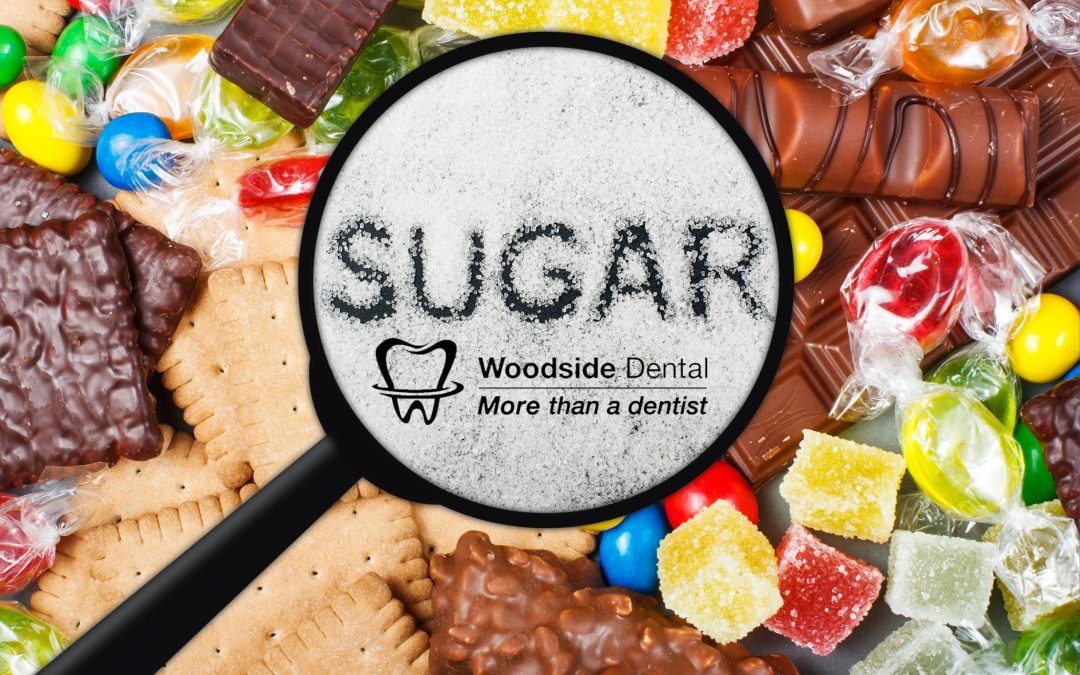When we talk about hidden sugars, we’re referring to the ones that aren’t obvious to the naked eye—the ones that hide in processed foods and drinks that you might not even realize have added sugar to them. This includes baked goods, sauces and marinades, condiments, salad dressings, ketchup, jam or jelly (even the healthy-looking versions), and even some protein bars.
All of these things may seem harmless or even healthy at first glance (after all, they’re marketed as health foods!), but they can wreak havoc on your teeth if you don’t watch out for them.
But how exactly do these types of sugars affect your teeth?
First off: they encourage cavities by eroding enamel. Enamel is what protects your teeth from decay—it’s a mineralised substance that coats each tooth’s surface and acts like a shield against acid erosion. If you eat foods or drinks with hidden sugars frequently enough over time, your enamel can wear away so much that it becomes porous enough for bacteria to enter into the tooth structure itself. And once there, those bacteria start breaking down tooth structure—which can lead to cavities!
Sugar is everywhere. It’s in our food, drinks and even some medications. While most of us know that too much sugar isn’t good for our health, few of us realize just how much it can negatively impact our oral health. Here are five surprising ways sugar affects the mouth:
-
More cavities
-
Tooth decay
-
Gum disease (gingivitis)
-
Periodontal disease (advanced gum disease)
-
Oral cancer
Glucose
Glucose is a type of sugar that is found in a variety of foods and drinks. It can be either natural, such as fruit and milk, or added to certain products. Glucose is usually used as an energy source by the body.
The human body needs glucose to function normally; however, it can also be harmful if consumed in excessive amounts or over long periods of time. It’s estimated that 75% of all people with diabetes have pre-diabetes—a condition in which blood glucose levels are higher than normal but not high enough to be diagnosed as diabetes.
When glucose enters the bloodstream, it triggers an increase in insulin levels. This rise causes the body to store more fat and release less fat from storage areas in the body, such as fat under the skin and around internal organs (visceral fat). Excess fat can lead directly to obesity or indirectly through other health conditions such as heart disease and high blood pressure.
Glucose also has been linked to tooth decay since bacteria thrive on carbohydrates like sucrose (table sugar) and fructose (fruit sugar), which are often added to processed foods such as cookies and chocolate bars.
Sugar Alcohols
Sugar alcohols are a subgroup of carbohydrates. They contain calories, but they do not digest like sugar and are not metabolized by the body. Therefore, they are often used in place of sucrose in low-calorie food products. Sugar alcohols occur naturally in small amounts in fruits, vegetables and dairy products. They are also manufactured by adding hydrogen to carbohydrates. The most common sugar alcohols include:
-
Erythritol (or Tagatose)
-
Mannitol (or Sorbitol)
-
Xylitol
-
Lactitol
Foods To Avoid
Sugar is one of the most common foods that lead to dental problems. Foods high in sugar content can cause tooth decay if eaten frequently.
Here are some foods to avoid when trying to maintain healthy teeth:
-
Fruit juice.
-
Sweets, including chocolate and gummy bears.
-
Bread and baked goods made with sugar or honey (such as cakes and cookies).
-
Cereal with added sugars or honey, such as sugary breakfast bars and granola.
-
Milk shakes and fruit smoothies made with added sugar or juice.
-
Pizza with sauce or cheese (the sauce is usually high in sugar).
Replace sugary sweeteners with non-sugar sweeteners
It is important to keep your sugar intake at a minimum by replacing sugary sweeteners with non-sugar sweeteners whenever possible.
Here are some tips on how to replace sugary sweeteners with non-sugar sweeteners:
-
Replace table sugar with stevia
-
Replace honey with maple syrup or agave syrup
-
Replace brown sugar with coconut sugar


Recent Comments